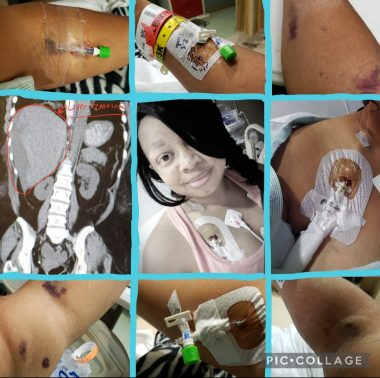Living With aHUS Has Taught Me to Wear My Battle Scars With Pride
A columnist describes the physical and emotional impact of the disease
Written by |

Escaping death doesn’t come easily. While my severe health issues resulted in emergency medical care and a rare disease diagnosis, they also left scars — physical and emotional.
I’d been unwell for much of 2020. My whole family had gotten COVID-19 in March, so when I started developing random symptoms a few months later, I assumed I was just tired from dealing with the virus and working too much at my new job.
But in September, I declined rapidly. I was losing feeling in my legs, couldn’t catch my breath, was throwing up blood, and spiked a 104 F fever. I finally had to go to the emergency room. I figured I had COVID-19 again and would simply need to rest at home for a few days.
But by the time I arrived at the ER, I was in multiorgan failure. Hospital staff had no clue what was going on with me, but they could tell I was dying. Four weeks into my medical “adventure,” I was diagnosed with the ultrarare disease atypical hemolytic uremic syndrome (aHUS). I had to spend another month in the hospital because I needed so much treatment and care.
Physical scars
My first and most obvious battle scars involved irreparable damage to several of my organs. During my hospitalization, I had multiple IV leads in both arms and the muscles around my heart became enlarged (a condition known as hypertrophic cardiomyopathy). My initial aHUS attack damaged my liver and uterus. I ended up needing a hysterectomy as a result, which left three laparoscopic scars on my stomach.
I also have two scars on my chest and neck from a central venous catheter. When I was admitted to the intensive care unit for treatment that fall, my kidneys were functioning at less than 5%. I needed dialysis for five months. Kidney biopsies left two additional scars on my back.
I joked to my last surgeon that if anyone saw my scars, I’d just say, “Oh, those are from when I saved the lives of a busload of school children!”

Shalana Jordan in the ICU, in September and October 2020. (Photos by Shalana Jordan)
As if having an ultrarare disease isn’t wild enough, I also have the rarest gene mutation of aHUS, which means I’ll need antibody therapy for the rest of my life. But the therapy affects me physically and emotionally, making me sick, achy, and miserable some days.
Emotional scars
Two years after my hospitalization, many questions still run through my mind. Did I really almost die? Were my children almost left motherless? What if my babies had been trapped at home alone with my body?
That last question weighs more heavily on me than the realization that I almost died. The lead nephrologist at the hospital said that if I’d waited 18 more hours to seek medical attention, my children likely would have found me dead.
Then there’s the medical trauma — who knew that was a thing?
During my hospitalization, I dealt with countless needles, tubes, invasive procedures, surgeries, injections, pain, chemicals, muscle atrophy, biopsies, dietary restrictions, blackouts, physical therapy, and more. It took me a long time to realize that those things didn’t just affect me physically.
One of the worst parts of living with aHUS is having huge life changes thrust upon you. Being so close to death, I didn’t have many options in terms of procedures, surgeries, and medications. This made me feel like I didn’t have much of a say in what was being done to my body. Every day a doctor or nurse would walk into my hospital room and explain they were wheeling me away for “this” treatment or “that” scan. It was difficult not to have control over my own body.
But over time, I’ve realized battle scars can be good for something.
My scars have changed my entire perspective on life. They’ve become a huge part of my character and have molded me into the person and mother I am today. I make myself and my health a priority so I can be a better, healthier person for my family. I value different things and don’t stress about the small stuff anymore.
To everyone battling a rare disease, I encourage you to share your story to empower others. Wear your scars proudly — you earned them.
Our scars are proof that we are warriors. Proof that we have fought and continue to fight every day. Proof that we’ve survived.
Note: aHUS News is strictly a news and information website about the disease. It does not provide medical advice, diagnosis, or treatment. This content is not intended to be a substitute for professional medical advice, diagnosis, or treatment. Always seek the advice of your physician or other qualified health provider with any questions you may have regarding a medical condition. Never disregard professional medical advice or delay in seeking it because of something you have read on this website. The opinions expressed in this column are not those of aHUS News or its parent company, Bionews, and are intended to spark discussion about issues pertaining to aHUS.






Leave a comment
Fill in the required fields to post. Your email address will not be published.